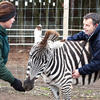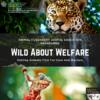Animal welfare
The promotion of good welfare for zoo animals is a priority BIAZA takes very seriously. Our members meet the needs of the animals in their care by understanding what constitutes good welfare, and by providing appropriate housing and husbandry.
Measuring Welfare
Factors we consider when assessing animal welfare include:

Physical health
Advances in preventative medicine and veterinary science should mean our animals maintain optimal health with quick diagnosis and treatment when necessary.
Nutrition is also essential and a good diet can support the immune system and prevent nutritional deficiencies.

Mental health
Research has demonstrated that an animal’s behaviour can indicate its underlying psychological state, so professionals with experience and knowledge of a particular species may be able to identify welfare concerns through behaviour abnormalities. Other indices may also reflect mental well-being, for example in times of stress a hormone called cortisol is secreted, which can be measured in an animal’s urine or faeces.

Social life
Zoos and aquariums aim to keep animals in social groups similar to those in the wild.
This not only supports good welfare, but also allows natural breeding patterns which are essential in maintaining long-term viable populations of endangered animals in captivity.

Enclosure space
It is essential that animals have access to sufficient amounts of space to satisfy their needs, but studies show that complexity, variety, challenge, and options within enclosures can be just as important as physical space.

Environmental enrichment
Environmental enrichment aims to mentally and physically stimulate captive animals, primarily through changes made to the animals’ environment. Enrichment techniques can involve the use of scent, noise, novelty and objects which require manipulation.
A common technique involves hiding food within an enclosure to stimulate the animal’s natural foraging behaviour; replicating how a wild animal would spend long periods actively searching for food.

Wild About Welfare Online Learning Programme
This online course is tailored towards anyone wanting to improve their knowledge and understanding of animal husbandry, behaviour, welfare and care as well as other aspects of animal management.
Each programme module has a learning document and an interactive quiz, with questions and activities to encourage knowledge retention and inspire learning. The programme is fully accessible from a computer or mobile device and is completely free to access.
By providing access to BIAZA’s members the Wild About Welfare programme has the potential to build on the advancing standards of animal welfare across its membership.
Wild Welfare is committed to improving captive wild animal welfare through education and capacity building.


